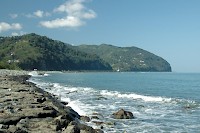Black Sea
Q166Black Sea: Sea between Europa and Asia, in Antiquity called Πόντος Εὔξεινος or Pontus Euxinus, "hospitable sea". It was surrounded by Scythia in the north, Thrace in the southwest, Anatolia in the south, and Colchis in the southeast. Its main outlet was the Bosphorus.

Covering more than 420,000 square kilometers, the Black Sea is the largest marginal sea belonging to the Mediterranean Sea. In fact, it is part of a series of large bodies of water: coming from Scythia in the north, the Don (Tanais) and Kuban (Hypanis) empty themselves in the Sea of Azov (ancient Maeotic Lake), which empties itself through the Strait of Kerch (Cimmerian Bosphorus) into the Black Sea, which in turn empties itself through the Bosphorus into the Sea of Marmora (Propontis), which empties itself through the Dardanelles (Hellespont) into the Aegean Sea.
The Black Sea is fed by several large rivers: from the west the river Danube and its tributary Prut (Pyretus), from the northwest the rivers Dniester (Tyras), Bug (Hypanis), Dnieper (Borysthenes), from the Sea of Azov the Don and Kuban mentioned above, from Colchis in the southeast the river Rioni (Phasis), and from Anatolia in the south the rivers Çoruh (Acampsis), Yeşilırmak (Iris), Kızılırmak (Halys), and Sakarya (Sangarius). The western and northern shores are open to the plains of Thrace and Scythia, in the east is the Caucasus Mountain Range, in the south rises the Anatolian Platform.
The Black Sea was surrounded by Greek towns, mostly founded in the eighth and seventh centuries BCE, although archaeological evidence proves trade contacts between the Aegean Sea, the western Black Sea and southern Black Sea as early as the Mycenaean age. A memory of this age may be found in the story of the Argonauts. The Greek colonization movement started in Miletus, but other Greek cities sent settlers as well.
Initially, the Greeks called the Black Sea the Πόντος Ἄξεινος, "unhospitable sea", rendering an older, Indo-European word for "dark". Considering this a bad omen, they changed the name into Πόντος Εὔξεινος (Latin Pontus Euxinus), "hospitable sea". The current Turkish name, Kara Deniz, is a return to the original name. It also expresses that the sea is darker than the Mediterranean Sea (Turkish Ak Deniz, "the bright sea").